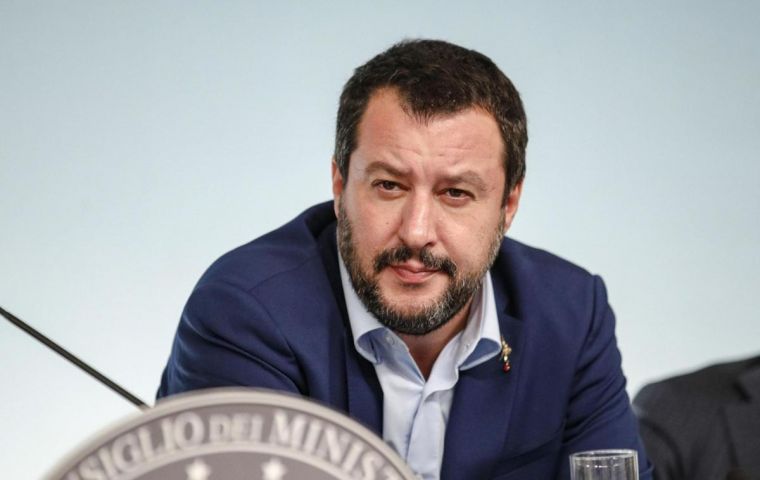MercoPress. South Atlantic News Agency
Another headache for the EU: Italy and its populist budget
 The budget proposes increases both Italy's overall government debt and its deficit pushing it as high as 2.4% of GDP. Mandated maximum deficit is 0.8% of GDP
The budget proposes increases both Italy's overall government debt and its deficit pushing it as high as 2.4% of GDP. Mandated maximum deficit is 0.8% of GDP  “The budget keeps government's promises while keeping public accounts in order,” said PM Giuseppe Conte. “Italy is a founding EU member and net contributor”
“The budget keeps government's promises while keeping public accounts in order,” said PM Giuseppe Conte. “Italy is a founding EU member and net contributor” Italy's government on Tuesday pushed the country closer to a showdown with the European Union after submitting its latest budget for review. The budget proposes increases both Italy's overall government debt and its deficit in the short run pushing the deficit as high as 2.4% of GDP over the coming years. This means Italy will fall foul of a previously mandated maximum deficit level of 0.8% of GDP.
Italy was asked to amend its budget by Euro zone authorities before submitting it, and was told that the proposals represent “significant deviation” from its mandate. It refused to do so, with the Italian parliament voting to approve the proposals on Monday evening.
“This budget keeps the government's promises while keeping public accounts in order,” Prime Minister Giuseppe Conte said at a press conference. “Italy is a founding EU member and a net contributor,” he added.
“On the strength of this position, we go to Brussels with a budget that we are proud of and that we want to discuss without prejudices.”
The problem for Italy, however, is that Brussels has the power to send back the budget if it does not believe Italy is fulfilling its obligations. This would set the scene for a serious clash between the EU and Italy.
Matteo Salvini, the leader of the Northern League, one of the two coalition partners in the Italian government, said on Monday evening thatthe government plans to go ahead with the implementation of its budget proposals, regardless of any opposition from Brussels.
“If Brussels says I cannot do it, I do not care, I will do it anyway,” Salvini said last week, referring to the budget's implementation.
Salvini's belligerent attitude puts the EU in a tricky position. If it backs down and lets the Italians implement a budget in violation of rules it has set out, it risks a backlash from other Euro-zone countries which have abided by budget rules, often to their detriment.
On the other hand, if it takes a hard stance and attempts to force the populist coalition into changing its budget, that could risk further alienating Salvini and his colleague, Luigi Di Maio, the leader of the Five Star Movement. This in turn, could bring back to the fore the aggressively euro-skeptic stance of the coalition, which was moderated when it took to power.
Official policy is that the government backs remaining in the European Union, but both Salvini and Di Maio are avowed euro skeptics, and Salvini is believed to privately back an exit from the single currency. In May, a leaked report, partly published by the Huffington Post, showed that both parties discussed a commitment to leave the euro prior to entering into government, before abandoning that pledge.
Officials sought to play down the chances of a major clash, with Giovanni Tria, Italy's foreign minister saying that the “idea that this budget will blow up Europe is totally unfounded.”
The threat of a clash between Rome and Brussels comes as the Italian political situation continues to spook markets. Last week, Italian stocks briefly slipped into a bear market, and while they have rebounded a little, they remain subdued — although Italy's benchmark share index, the FTSE MIB is more than 1% higher on Tuesday.
Bond markets have also responded strongly to the crisis, with the yield on the 10-year Italian bond rising above 3.6% last week, its highest level in four years.




Top Comments
Disclaimer & comment rulesCommenting for this story is now closed.
If you have a Facebook account, become a fan and comment on our Facebook Page!